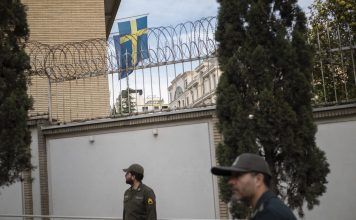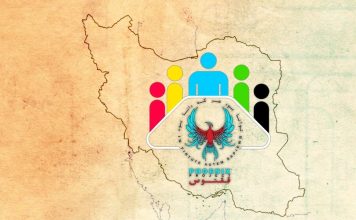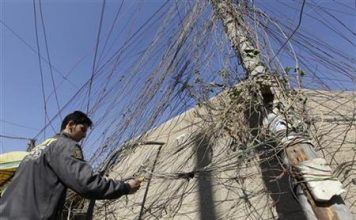By Natasha Phillips
The Islamic Republic of Iran executed Samira Sabzian, a victim of child marriage, on Dec. 20, according to a post on X by Mozhgan Keshavarz, an exiled political prisoner who once shared a cell with Samira. A court had found her guilty of killing her husband.
“Goodbye my friend. Samira, forgive me, I tried my best, it didn’t work,” Keshavarz said. “Another victim was executed!#سمیرا_سبزیان [Samira Sabzian] was killed a few minutes ago. The Islamic Republic is a killer of humanity.”
“Today, right after the call for morning prayer, the regime in Iran executed Samira Sabzian,” human rights activist Masih Alinejad said in a post on X. “@mozhgankshavarz Iranian activist who was her cellmate says: ‘Samira was a victim of child marriage, I witnessed how much she suffered in prison from being denied to have access to her children.’
The execution follows a verdict in Sweden on Dec. 19 in which a Swedish court upheld a life sentence for Iranian official Hamid Noury. Noury was found guilty of involvement in the mass execution of political prisoners in Iran in 1988.
Samira was given the death penalty after a court found the young woman guilty of killing her husband.
Samira’s case went viral on social media, with human rights organizations and lawmakers leading calls to stop the execution.
“The UK calls on Iran to halt the planned execution of Samira Sabzian. Samira is a victim of child marriage,” British lawmaker Lord Tariq Ahmad said in a Dec. 19 post on X. “The UK co-sponsored a resolution at the UN demanding Iran end the use of the death penalty. Iran must cease its appalling treatment of women and girls.”
Thousands of Child Marriages are Celebrated In Iran Each Year
Iran’s regime is the world’s biggest executioner of women and children. At least 16 women and three children were executed in Iran in 2022, according to a Dec. 19 report by the World Coalition Against the Death Penalty.
“There is concern that during the Christmas and New Year holidays, when many parts of the world are on vacation, more people may be at risk of execution,” Mahmood Amiry-Moghaddam, Director of the Oslo-based Iran Human Rights (IHRNGO) said. “During this time, particularly individuals such as women, juvenile offenders, protesters, and political prisoners whose executions could elicit stronger reactions under normal circumstances are at greater risk.”
The Islamic Republic, whose legal code is based on Sharia law, also allows and encourages child marriage. It is estimated that one-fifth of all marriages in Iran are child marriages.
More than 1 million girls were married in Iran from 2014 to 2021, including 13,500 girls under the age of 13, according to a 2021 report by Iran’s Civil Registration Organization. Some experts believe that the actual number of child marriages is much higher than the official figure, as many marriages are not officially registered, particularly in rural areas.
Samira Sabzian was forcibly married to her husband when she was 15 and allegedly killed him in 2014 when she was 19, according to a 2016 report by Iranian news agency Rokna.
The young woman was accused of planning the murder with her then 14-year-old sister, by lacing a glass of fruit juice with poison and giving it to her husband to drink.
Samira’s two children were aged 7 and 10 at the time of her imprisonment, almost a decade ago. She agreed not to see her children while in prison to obtain forgiveness from her husband’s family, according to a Dec. 11 report by IHRNGO. Samira saw her children on Dec. 11 for the first time since being jailed. The children, now aged 17-years-old and 10-years-old, visited their mother to say goodbye before her execution.
Executions Have Surged In Iran Following Protests, Boroumand Center Reports
Under Sharia Law, individuals sentenced to qisas (retribution-in-kind) for murder can be spared the death penalty if they are granted forgiveness by relatives of the deceased. The husband’s parents asked for Samira to be executed.
During her trial, Samira “burst into tears and trembled” according to the report by Rokna.
Rokna, which appears to have relaunched in recent months, was shut down by Iran’s government in February 2022 after it shared graphic content. The government closed the news outlet following the publication of photos and video footage showing a husband in Ahvaz carrying the head of his wife in his hand.
Sajjad Heydari beheaded his 17-year-old wife, Mona Heydari on Feb. 5, in a so-called “honor killing” after she fled to Turkey to live with a Syrian man she met online. The mother of one returned to Iran after her family assured her she would not be harmed.
The footage of the incident, which included videos of Heydari walking around the streets of Ahvaz with a bloodied knife in one hand and Mona’s head in his other hand went viral, and caused a global outcry.
The Committee for the Supervision of the Press voted for the closure of the media outlet after it found that it had breached “public decency” and reported incidents “in contradiction with society’s mental hygiene.”
“Although media outlets should present problems and the dark side [of society], this should not be injurious to public opinion,” Iman Shamsaei, the director general of domestic news agencies and press at the Iranian Ministry of Culture and Islamic Guidance said.













